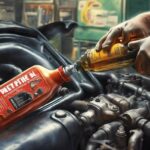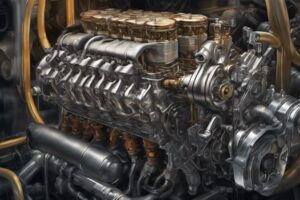If your car is shaking when driving or when sitting at the traffic lights idling, and the check engine light is on too, then there is no denying that there is a problem with the engine. What causes this problem and how do you fix it?
In general, if the check engine light is flashing and the car is shaking then there is a problem with one or more engine components. The problem could lie with the fuel supply, a faulty ignition coil, bad spark plugs, or a bad engine sensor. If the car is only shaking when idling then the problem may be with the idle air control valve.
It’s usually a good idea to not drive your car if it is shaking badly or if the check engine light is flashing as it can often be a sign of a serious engine fault that you should get checked out.
What Causes A Flashing check engine light and a shaking Car? (6 Common Causes)
A flashing check engine light and noticeable car shaking are usually caused by a cylinder misfire.
When a cylinder misfires, it disrupts the engine’s combustion process, leading to imbalanced power output and causing the vehicle to shake.
This misfire also results in unburned fuel entering the exhaust system, which can falsely alter the readings of the oxygen sensor, triggering the check engine light.
The Engine Control Unit (ECU) monitors engine performance and, upon detecting a misfire, activates the check engine light as a warning and may adjust the engine operation, potentially causing further shaking.
Here are some common causes of a check engine light and a shaking car in more detail:
Cause 1: A blocked fuel filter (or poor fuel pressure in general)
Engine misfire is a common cause of car shakes, especially if it happens when you push on the accelerator. This can often be caused by a lack of adequate fuel pressure in the cylinder. Sometimes, a lack of fuel can be caused by a blocked fuel filter that hasn’t been changed on schedule.
If the fuel injector is expecting a certain amount of fuel and it doesn’t receive it, then this will cause the cylinder to misfire as the air to fuel ratio will be wrong.

Cause 2: A faulty fuel injector
Bad fuel injectors are another very common engine problem that can cause engine shaking and a check engine light.
Modern engines use a technique known as direct injection to get the fuel into the engine cylinder. A very precise amount of fuel is delivered by the fuel injectors controlled by the ECU.

The most common ways that a fuel injector can fail are if they become blocked or if they start to leak.
A fuel injector can become blocked if the tip or nozzle becomes dirty, and partially blocked. When you shut off your engine, the injectors can stay hot for a long time due to the heat from the engine.
Another common cause of leaky injectors is the failure of the O-ring where the injector meets the fuel rail. These O-rings are made from rubber and can become hard and brittle from the heat of the engine.
Cause 3: A bad ignition coil
Bad ignition coils or coil packs are a common cause of engine misfires and engine shaking. Ignition coils are basically mini transformers that generate a high voltage current that powers the spark plug.
The symptoms of a bad ignition coil include engine misfires, a rough engine idle, a decrease in power, poor fuel economy and an engine that is difficult to start.
If you try to start or run an engine with one or more faulty ignition coils the engine will likely sputter, hesitate, misfire, and even stall.

A diagnostic test will usually reveal error codes P0351 to P0358 if there is a faulty ignition coil.
Cause 4: A bad idle air control valve (shaking when idling but stops when driving )
The idle air control valve controls the idle speed of the engine by allowing a flow of air to pass around the throttle plate using a built-in conduit on the throttle body. This is necessary because when the engine is idling, the throttle is completely closed.
A faulty idle air control valve can affect the amount of air entering the engine when idling, causing it to misfire and shake. This will usually cause a check engine light and error code P0505.
Cause 5: Bad spark plugs
Another common cause of engine misfire and a shaking car is bad spark plugs. If one or more of the spark plugs is not operating properly, then this will cause the affected cylinder to misfire.
Continuous misfires will lead to a rough, shaking engine and will usually result in a check engine light. Common bad spark plug error codes include P0300, P0420 and P0430.

Spark plug failure can often be caused by a build-up of carbon deposits on the spark plug tip due to a long-term fuel to air ratio imbalance. They can also become burnt or corroded or can become contaminated by engine oil or even engine coolant.
Can Front-End Suspension Issues Cause a Car to Shake with a Flashing Check Engine Light?
When experiencing a shaking car with a flashing check engine light, faulty frontend suspension workings explanation should be considered. Front-end suspension issues, such as worn out shocks or struts, can cause instability and vibrations, leading to the shaking sensation. It’s essential to have a professional diagnose and repair the problem promptly.
Cause 6: Bad engine sensor
All modern engines rely on sensors to keep them running. Sensors monitor all sorts of different engine component functionality and engine conditions such as the amount of air entering the engine, the engine temperature, fuel pressure, air pressure, engine timing, engine oil pressure and exhaust gas composition.
A bad engine sensor will usually adversely affect engine performance and can lead to issues such as shaking, lack of engine power, poor fuel economy and engine stalling.
What Next: How to fix a flashing check engine light and shaking car?

The good news is that if the check engine light is blinking, then there is almost certainly an engine trouble code stored in the ECU. So the first step in diagnosing the problem is to run a diagnostic using an error code reader. This will help to point you in the direction of the problem.
- If the error code points to a problem with fuel pressure, then start by changing the fuel filter and checking for blockages or leaks in the fuel system. If there is no specific error code pointing to a particular component such as the fuel pump, fuel rail, or fuel injector then it can get more difficult to diagnose, especially if changing the fuel filter doesn’t solve the problem.
- Error codes such as P0301 to P0304 usually indicate a problem with the ignition of the fuel in the cylinder. This can often be rectified by changing the spark plugs and checking that the ignition coils are all working.
- A failed engine sensor will usually have a specific error code that you can look up. This type of problem will usually be resolved by changing the offending sensor and clearing the trouble code from ECU memory.
- A bad idle air control valve can often be first identified by the problem going away when the vehicle is moving. A faulty idle air control (IAC) valve usually has an error code of P0505. You can also perform a number of tests on the IAC to assess how well it responds to a change in RPM or a change in engine conditions.
As an Amazon Associate we earn from qualifying purchases.









My car has been shaking a lot recently, especially when I’m at the traffic lights, and my check engine light has come on. I’m not very knowledgeable about cars. Can this shaking damage my car if I continue driving it like this?
I’ve noticed my car shaking a lot recently and the check engine light just came on. Could it be something simple I can fix myself, or should I be prepared for a bigger issue?